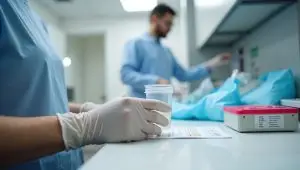Navigating the world of employment drug tests can feel like wandering through a maze. If you're pondering whether these tests include alcohol, you're not alone. Many job seekers and employees alike face this question. This guide will illuminate the ins and outs of employment drug testing, with a particular focus on alcohol and other substances. By the end, you'll have a clearer understanding of what to expect and how to prepare.
Key Takeaways
- Employment drug tests are commonly used by companies to maintain a safe and productive workplace by screening for drug and alcohol use.
- The presence of alcohol testing in employment drug tests depends on factors like industry regulations and company policies.
- Common substances screened in drug tests include THC, opiates, cocaine, amphetamines, and PCP, with methods like urine, blood, hair, and saliva tests used based on needs.
- Failing a drug test can result in job loss, hinder future employment opportunities, and lead to a protocol involving discussion and possible retesting.
- Preparing for a drug test involves avoiding substances that can trigger positives and being informed about your employer's specific testing policies.
Introduction
Employment drug tests are as common as Monday morning coffee in many workplaces. They serve as gatekeepers in the hiring process, often standing between you and your next opportunity. But beyond the general notion of screening, understanding precisely what's tested for can feel like sorting through a fog. This clarity is essential because not all tests cover the same substances, and this often leads to a lingering question in the minds of job seekers everywhere: "Do these tests check for alcohol?" Unraveling this question and exploring what you might encounter in the realm of employment drug screening is what this article sets out to achieve. Buckle up for an enlightening journey that will not only shed light on alcohol testing but also delve into the broader landscape of what employment drug tests are all about.

Understanding Employment Drug Tests
Employment drug tests are tools that employers use to ensure that the workplace remains safe and productive. These tests aim to deter drug and alcohol use among employees, thereby reducing accidents and enhancing performance. Different types of tests are implemented based on the job's nature and specific requirements.
Common Tests include urine tests, which are the most prevalent due to their cost-effectiveness and broad detection window. Blood tests provide detailed information about substance levels but are less common due to their invasive nature. Hair tests can detect drug use over a longer period, while saliva tests, including drug mouth swabs, are useful for identifying recent use, often within the past 24 to 48 hours. Each method has its advantages and limitations, depending on what substances need to be detected and how recent the consumption was.
In terms of regulations, employers must adhere to laws that ensure the fairness and legality of drug testing. These regulations might vary by state and type of job. It’s crucial for employers to be compliant with Department of Labor guidelines, which outline appropriate testing procedures and protect employee rights. Following these guidelines helps to strike a balance between workplace safety and individual privacy, ensuring that testing is implemented respectfully and lawfully.
Do Employment Drug Tests Test for Alcohol?
Employment drug tests can include alcohol screening, but it often depends on the job and the workplace policies in place. Generally, alcohol tests are more common in fields where safety is a significant concern, such as transportation, construction, and roles that involve operating heavy machinery. In environments with stricter safety protocols, like aviation or trucking, employers are mandated by federal regulations—specifically the Department of Transportation (DOT)—to test for alcohol. These tests are designed to ensure a safe workplace by confirming that employees are not under the influence while performing job duties.
There are different testing methods used to detect alcohol. A breathalyzer is the most immediate and familiar option, commonly used by law enforcement and frequently implemented in workplace settings. Blood tests can measure Blood Alcohol Concentration (BAC) and are more invasive but provide accurate readings of current intoxication levels. Urine tests can show evidence of alcohol use but are less common due to the short time frame of alcohol’s presence in urine.
Employers might conduct alcohol testing pre-employment, randomly, or after an incident to ensure compliance with a zero-tolerance policy. Industries with strict regulations, like transportation, often have additional rules requiring testing after any incident to rule out impairment. Understanding these scenarios is crucial as a candidate or employee. Being prepared with this knowledge allows one to align with employer expectations and adhere to workplace safety standards effortlessly.
Other Commonly Screened Substances
When it comes to employment drug tests, there's a usual lineup of substances that make an appearance on the screening list, often overshadowed by the focus on alcohol. Let's take a casual walk through the list of usual suspects that might land you in a sticky situation during a drug test.
Urine Drug Test Costs
Think of urine drug tests as the old faithful of screenings. They're affordable, efficient, and widely used. On average, a basic urine drug test can set an employer back anywhere from $30 to $60. The price can shoot up depending on the range of substances being tested for and the testing method. Employers might spring for pricier options when needing to screen for an extended panel of drugs or ensuring a more precise result.
Substances Included
Here's where the real action is. Besides alcohol, employers often check for a standard roster of substances, including THC, opiates, cocaine, amphetamines, and PCP. THC is a big one, being the active component in marijuana, which is a frequent cause of positive results given its legality status is still a gray area in many places. Employers are on the lookout for these substances to catch any potential unwarranted behavior or misuse that could pose a risk in the workplace.
Special Cases
Now, let’s peel back the layers on some quirky questions, like "Will THC lotion show on a drug screen?" Generally speaking, THC-infused lotions or topical applications are less likely to cause a positive drug test. They don't typically reach the bloodstream at levels high enough to be detected in a urine test. But there's always a "better safe than sorry" rule of thumb. Or take the rising popular query, "Does CBD show up in a drug test Australia?" Most drug tests don't hunt CBD; however, trace amounts of THC in some CBD products could potentially trigger a positive result, making it essential to source from reputable manufacturers.
Ultimately, understanding what substances are commonly screened can demystify the process and help you sidestep any unintended pitfalls. Stay sharp, check ingredient labels, and know what's being tested to keep that test result clean and your employment prospects secure.
How Employment Drug Tests are Conducted
When it comes to the nuts and bolts of employment drug testing, understanding the process can ease the anxiety of the unknown. Let’s break it down.
Pre-Employment Screens: Many companies require a clean slate for new hires, and pre-employment screens ensure just that. Often, these tests check for a variety of substances, but they may specifically look for alcohol, especially if the job involves operating heavy machinery or involves safety-sensitive roles. Blood tests and breathalyzers are commonly used and can detect alcohol consumed more recently.
Random and Post-Accident Testing: If you're already employed, random testing might still be on the table. This is less about suspicion and more about deterrent. For post-accident tests, the aim is to rule out substance use as a contributing factor. These tests can include standard panels that check for alcohol, especially in zero-tolerance environments.
Non CDL DOT Physical Drug Test: On the transportation front, non-CDL drivers might not be as rigorously tested as their CDL counterparts, but alcohol testing can still be required, depending on employer policy. For safety and compliance, checks are conducted through various biological samples like urine or breath analysis.
Drug Mouth Swab: These swabs are the new kids on the block, favored for their ease of use. Though typically used to trace drug use, including THC and opiates from the past few days, they can also detect alcohol levels, often stretching up to 24 hours post-consumption. For those wondering about the time needed to pass a swab test, it can fluctuate depending on usage patterns.
The methodologies and frequency can vary, but a general rule of thumb? Know your employer's policies, and don't cross the line with substances that could jeopardize your job.
What to Expect if You Fail a Drug Test
Failing a drug test can have serious repercussions and is often surrounded by a swirl of anxiety. First, it's important to realize that a failed test doesn't immediately mean the end of employment. However, the implications can vary significantly based on the company, your role, and the substance detected.
Consequences
The most immediate consequence of failing a drug test is the potential loss of a job offer or current position. Many employers have zero-tolerance policies, especially in safety-sensitive industries, meaning a failed test can lead to termination without much recourse. Besides job loss, failing a drug test might bar you from reapplying to the same company in the future.
Employer Protocols
After a failed test, employers typically follow set procedures. Initially, you might be called in for a discussion, offering a chance to explain or contest the results. Sometimes a retest is possible, particularly if there's a chance of a false positive. However, most companies prioritize their policies over individual pleas, especially if a zero-tolerance stance is in place.
Legal Implications
While failing a drug test doesn't usually result in legal action against the individual, it can raise concerns during background checks. This can act as a red flag for future employers, impacting employment prospects beyond the current company. It's worth noting that different states or countries may have varying legal responses, particularly if substances involved are illicit in the area's jurisdiction.
Understanding these potential outcomes can aid in navigating the aftermath of a failed drug test with clarity and readiness.
Preparation
When it comes to preparing for an employment drug test, simplicity is key. The main goal is to ensure your body is clean of any substances that might trigger a positive result. Start with the basics: steer clear of drugs and alcohol well in advance of your test date. It might sound obvious, but time is your best friend when it comes to flushing your system.
Here's a pro tip: be aware of over-the-counter medications and supplements that could result in false positives. Common culprits like poppy seeds, certain cold medications, and even vitamin supplements can skew results, so scrutinize your intake.
Frequently Asked Questions
How long will it take to clear the substances from my saliva?
For most drugs, mouth swabs will only detect recent use, typically within the past 24 to 48 hours. Thus, abstaining in the days leading up to your test is crucial.
For more in-depth reading, check out external resources like The Professional Background Screening Association or internal blog resources where you can dig deeper into specifics. Whether it’s CBD quandaries or timing issues, staying informed empowers you to face employment screenings with confidence.
Conclusion
In wrapping up, this article has illuminated the specifics of employment drug testing, underscoring alcohol's role within it. We've navigated through the pivotal information: employers' motivations for testing, the various methods employed, and the particularities that distinguish alcohol screening from other substances.
Being informed is the first line of defense. Understanding whether and how employers test for alcohol can prevent surprises and equip you to meet those expectations head-on. Whether your workplace enforces a zero-tolerance policy or adheres to standard procedures, the key takeaway is to always be clear about your employer's drug testing framework.
Approaching this with the right knowledge puts you on strong footing. Take proactive steps, seek clarification when needed, and stay ahead of potential pitfalls. In the end, knowledge is empowering—and with it, you're better prepared to navigate employment screening requirements with confidence.
Additional Resources
- U.S. Department of Labor. (n.d.). Drug testing in the workplace. Retrieved from https://www.dol.gov/agencies/odep/topics/drug-testing
- Substance Abuse and Mental Health Services Administration. (2008). Workplace substance abuse and HIV/AIDS: 2007 current practices and policies. Retrieved from https://store.samhsa.gov/product/Workplace-Substance-Abuse-and-HIV-AIDS-2007-Current-Practices-and-Policies/SMA08-4343
- Robertson, A., & Stevens, G. (2018). The impact of workplace drug testing on employee behavior. Journal of Occupational and Environmental Medicine, 60(10), 931–936. doi: 10.1097/JOM.0000000000001434
- National Institute on Alcohol Abuse and Alcoholism. (n.d.). Alcohol use in the workplace. Retrieved from https://www.niaaa.nih.gov/publications/brochures-and-fact-sheets/alcohol-use-workplace
- Normand, J., Lempert, R. O., & O'Brien, C. P. (2001). Under the influence? Drugs and the American workforce. Journal of Applied Psychology, 86(2), 261–274. doi: 10.1037//0021-9010.86.2.261
- Society for Human Resource Management. (n.d.). Drug-free workplace policy. Retrieved from https://www.shrm.org/resourcesandtools/tools-and-samples/policies/pages/drugfreeworkplacepolicy.aspx
- U.S. Department of Transportation. (n.d.). Part 40 - Procedures for transportation workplace drug and alcohol testing programs. Retrieved from https://www.transportation.gov/odapc/part-40

GCheck Editorial Team
Meet the GCheck Editorial Team, your trusted source for insightful and up-to-date information in the world of employment background checks. Committed to delivering the latest trends, best practices, and industry insights, our team is dedicated to keeping you informed.
With a passion for ensuring accuracy, compliance, and efficiency in background screening, we are your go-to experts in the field. Stay tuned for our comprehensive articles, guides, and analysis, designed to empower businesses and individuals with the knowledge they need to make informed decisions.
At GCheck, we're here to guide you through the complexities of background checks, every step of the way.





